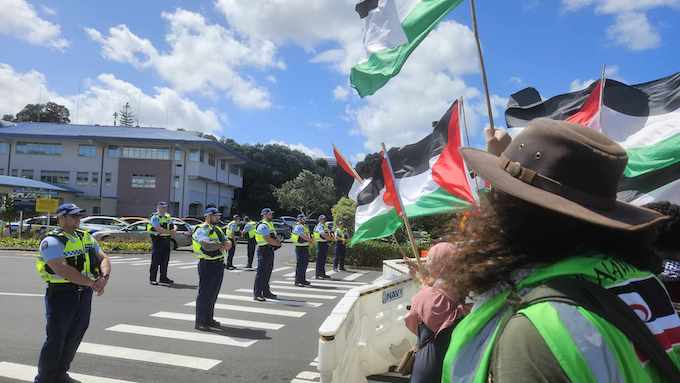
Aotearoa New Zealand must ramp up pressure on Israel to abide by last month’s International Court of Justice ruling, writes John Minto.
COMMENTARY: By John Minto
In 2003, the International Court of Justice ruled that Israel’s “apartheid wall” being built through Palestinian territory was a violation of international law and should be dismantled. Israel ignored the ruling and more than 20 years later the wall remains a potent symbol of Israeli policies of segregation based on ethnicity.
Last December, Israel was taken to the court again, this time by South Africa which argued Israel was committing genocide against the Palestinian people in Gaza with genocidal talk from Israeli leaders and indiscriminate killing of civilians — more than 27,000 killed so far including more than 12,000 Palestinian children.
The charge of genocide against Israel will take years to be heard and decided upon but in the meantime South Africa argued for the court to issue interim orders to require Israel to end its military operation and allow desperately needed humanitarian assistance to flow freely into Gaza.
Last month, the ICJ gave an interim ruling and although it did not demand an immediate ceasefire, it agreed with South Africa’s case that there was evidence to suggest Israel had breached the Genocide Convention and requiring Israel to report back to the court within a month on the steps it was taking to protect Palestinian lives and their very existence in Gaza.
Israel is now on probation. What happens in the coming weeks will determine whether Israel ends its killing spree in Gaza or shows the ICJ its middle finger as it did in 2003.
Commentary on the ICJ decision indicates the huge moral weight the decision carries for Israel and its small coterie of supporters, including New Zealand, which has been complicit through its silence, to end the war on Gaza.
The only way Israel will follow the ICJ ruling is if it comes under enough pressure from countries such as New Zealand.
Strong demand or look away?
Western countries have previously called on other countries to abide by ICJ rulings — such as the ruling which said Russia must end its war in Ukraine. Will we make the same strong demand of Israel or will we look the other way?
So far New Zealand has been equivocal, Foreign Minister Winston Peters making a few obligatory tweets but nothing more. The contrast with how we dealt with Russia compared with Israel could not be clearer.
The Foreign Minister’s stance seems more aimed to avoid difficult conversations with US representatives at diplomatic cocktail parties than pressure to end the killing of Palestinian children.
With Israel’s history of ignoring international law, New Zealand must speak out in a principled, assertive way. The alternative is to be silent and for this country to suffer derision for such cowardly, obsequious behaviour.
Already New Zealand is swimming against the tide of world opinion. We have refused to criticise the killing of Palestinian civilians by Israel despite loudly condemning the killing of Israeli civilians in the October 7 attack.
We have also refused to condemn other war crimes such as the “collective punishment” of Palestinians through the withholding of food, water and other necessities of life. We haven’t even made an unequivocal call for an immediate, permanent ceasefire or called for an International Criminal Court investigation into war crimes on and after October 7.
We did this for Russia’s invasion of Ukraine, so why the reticence over the Middle East?

NZ’s selective morality
Our embarrassing history is one of selective morality. In 2014 when Israel launched a war on Gaza with similar mass killing of Palestinians, the John Key government called in the Israeli ambassador and made clear New Zealand’s expectations. The Christopher Luxon-led government has failed to take even this most rudimentary measure.
The time for doing that is well past. We must indicate to Israel that its behaviour is morally and ethically reprehensible.
The government should immediately close the Israeli embassy until Israel is in full compliance with the ICJ decision as well as the broader provisions of international law such as allowing Palestinian refugees the right to return to their land and homes in Palestine, ending the military occupation and ending Israel’s apartheid policies against Palestinians.
Wringing our hands is not an option. It might be acceptable for the comfort of the Minister of Foreign Affairs but for Palestinians it means ongoing death and destruction.
John Minto is the national chairman of Palestine Solidarity Network Aotearoa (PSNA) and contributes to Asia Pacific Report. This article was first published by the Otago Daily Times and is republished with the author’s permission.











































